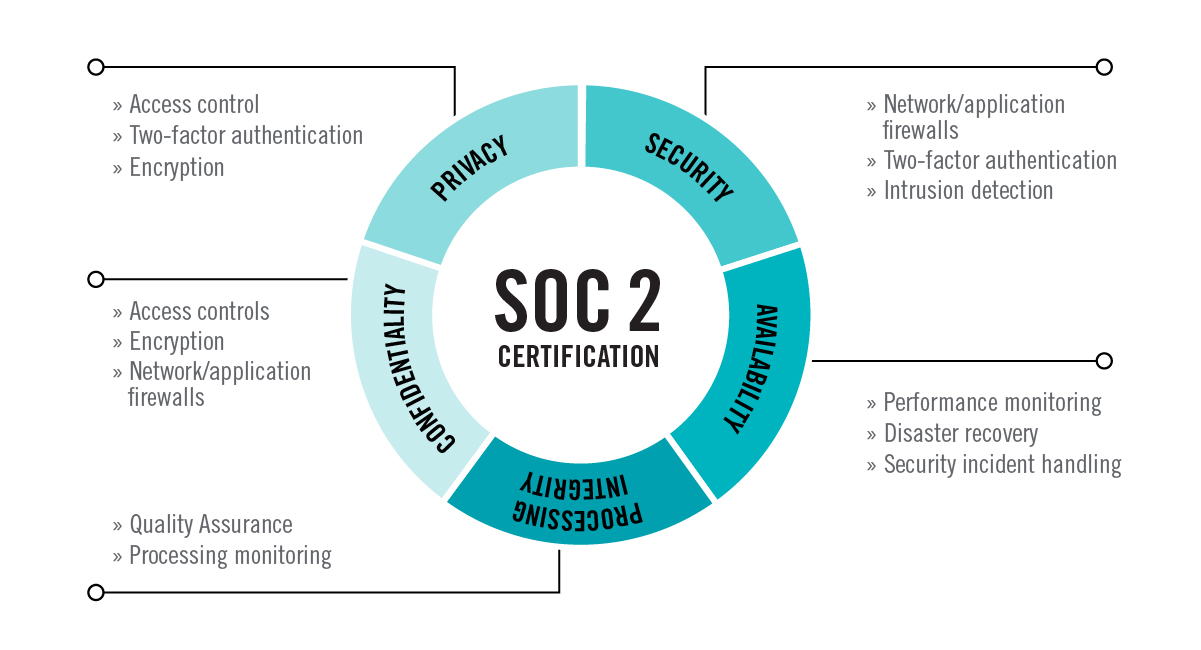 |
| ICE is SOC-2 Certified |
|
Why It’s Important to Work with a SOC-2 Compliant Partner
Many of our clients today have different compliance requirements such as ISO, HIPAA, Hitrust, CLIA, GDPR, NIST, and others. All of these require that the IT service provider be SOC-2
compliant, yet we’ve found that more than 95% of our competitors are not SOC-2 certified, and we believe this really differentiates ICE. In
fact, more and more organizations are asking that their managed service provider (MSP) undergo a SOC-2 audit before engaging with them. This makes perfect sense to us—organizations
want to know how secure an outside vendor really is.
The SOC-2 certification is a coveted and hard to obtain information-security certification, and it demonstrates that an independent accounting and auditing firm has examined an organization’s
non-financial reporting control objectives and activities, and has actually tested those controls over time to ensure that they are operating securely and effectively.
What is SOC-2?
Developed by the American Institute of CPAs (AICPA), SOC
stands for Service and Organization Control. It defines criteria for managing customer data based on five “trust service principles”—security, availability, processing
integrity, confidentiality, and privacy.
Issued by outside auditors, SOC-2 certification assesses the extent to which a vendor such as ICE Consulting complies with the five trust principles based on
the systems and processes in place. Trust principles are broken down as follows:
|
|

Is the system protected against unauthorized access?
The security principle refers to protection of system resources against unauthorized access. Access controls help prevent potential system abuse, theft or unauthorized
removal of data, misuse of software, and improper alteration or disclosure of information. IT security tools such as network and web application firewalls (WAFs), two
factor authentication and intrusion detection are useful in preventing security breaches that can lead to unauthorized access of systems and data.
|
|

Is the system available for operation and use as agreed?
The availability principle refers to the accessibility of the system, products, or services as stipulated by a contract or service level agreement (SLA). As such, the
minimum acceptable performance level for system availability is set by both parties. This principle does not address system functionality and usability but does involve
security-related criteria that may affect availability. Monitoring network performance and availability, site failover and security incident handling are
critical in this context.
|
|
|

Is the system processing complete, valid, accurate, timely, and authorized?
The processing integrity principle addresses whether or not a system achieves its purpose —and delivers the right data at the right price at the right time. Accordingly,
data processing must be complete, valid, accurate, timely, and authorized. However, processing integrity does not necessarily imply data integrity. If the data contains
errors prior to being input into the system, detecting them is not usually the responsibility of the processing entity. Monitoring of data processing, coupled with
quality assurance procedures, can help ensure processing integrity.
|
|

Is the information that’s designated as confidential protected as agreed?
Data is considered confidential if its access and disclosure is restricted to a specified set of persons or organizations. Examples may include data intended only for
company personnel, as well as business plans, intellectual property, internal price lists and other types of sensitive financial information. Encryption is an important
control for protecting confidentiality during transmission. Network and application firewalls, together with rigorous access controls, can be used to safeguard information
being processed or stored on computer systems.
|
|
|

Is personal information collected, used, retained, disclosed, and destroyed in accordance with the entity’s privacy notice?
The privacy principle addresses the system’s collection, use, retention, disclosure, and disposal of personal information in conformity with an organization’s
privacy notice, as well as with criteria set forth in the AICPA’s generally accepted privacy principles (GAPP). Personal identifiable information (PII) refers
to details that can distinguish an individual (e.g., name, address, Social Security number). Some personal data related to health, race, sexuality, and religion is
also considered sensitive and generally requires an extra level of protection. Controls must be put in place to protect all PII from unauthorized access.
|
|
|
|
|
